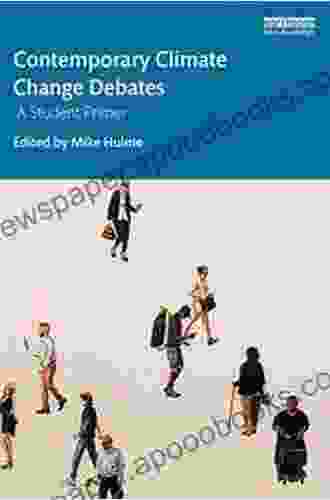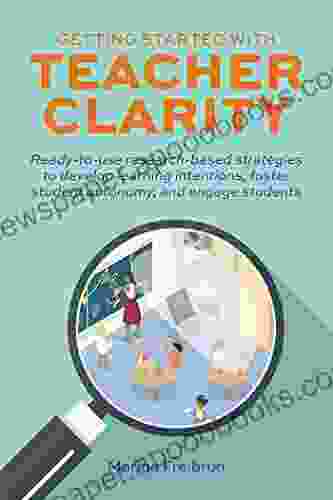Contemporary Climate Change Debates: A Comprehensive Guide for Students

In the face of an increasingly pressing global crisis, climate change has emerged as one of the most consequential and multifaceted issues of our time. Its profound implications for the environment, society, and generations to come demand informed and nuanced understandings, particularly among students who will inherit the responsibility of navigating this complex landscape.
4.5 out of 5
| Language | : | English |
| File size | : | 6672 KB |
| Screen Reader | : | Supported |
| Print length | : | 280 pages |
This comprehensive student primer aims to provide a thorough examination of contemporary climate change debates, enabling readers to grasp the intricate interplay of science, policy, and societal perspectives. It delves into the scientific consensus, exploring the unequivocal evidence of human-induced climate change and its far-reaching consequences.
The Science of Climate Change
The scientific understanding of climate change has evolved significantly over the past century, with a vast body of research firmly establishing human activities as the primary driver of global warming.
Our planet's atmosphere acts like a greenhouse, trapping heat from the sun. Greenhouse gases, primarily emitted through the burning of fossil fuels, accumulate in the atmosphere, intensifying this effect and leading to a gradual rise in global temperatures.
The impacts of climate change are already being felt worldwide, manifesting in rising sea levels, increasingly extreme weather events, shifts in agricultural yields, and disruptions to ecosystems.
Key Evidence of Human-Induced Climate Change
- Rising global temperatures: The average global temperature has increased by approximately 1.1 degrees Celsius since the late 19th century.
- Accelerating sea level rise: The rate of sea level rise has doubled since 1993, posing significant threats to coastal communities.
- Melting glaciers and polar ice caps: The extent and thickness of glaciers and polar ice caps have diminished significantly, contributing to sea level rise and altering ecosystems.
- Changes in precipitation patterns: Climate change has led to alterations in precipitation patterns, including more frequent and intense droughts, floods, and storms.
- Extreme weather events: The frequency and intensity of extreme weather events, such as heatwaves, wildfires, and hurricanes, have increased, amplifying risks to human life and infrastructure.
Policy Responses to Climate Change
Addressing climate change requires a multifaceted approach, encompassing both mitigation and adaptation measures. Mitigation efforts focus on reducing greenhouse gas emissions, primarily by transitioning to renewable energy sources, promoting energy efficiency, and implementing sustainable land-use practices.
Adaptation measures, on the other hand, aim to enhance resilience to the unavoidable impacts of climate change. This includes investing in infrastructure, developing early warning systems, and implementing policies that support vulnerable communities.
Key International Agreements and Policies
- United Nations Framework Convention on Climate Change (UNFCCC): This international treaty provides a framework for global cooperation on climate change, setting the ultimate objective of stabilizing greenhouse gas concentrations in the atmosphere.
- Kyoto Protocol: This international agreement, adopted under the UNFCCC, established legally binding emission reduction targets for developed countries.
- Paris Agreement: The landmark Paris Agreement, adopted in 2015, aims to limit global warming to well below 2 degrees Celsius, with efforts to pursue 1.5 degrees Celsius. It sets forth voluntary emission reduction commitments by individual countries and establishes a global stocktake mechanism to monitor progress.
Climate Justice and Equity
Climate change poses significant challenges to social justice and equity, as its impacts are disproportionately felt by vulnerable populations.
Developing countries, which have contributed less to historical greenhouse gas emissions, often bear the brunt of climate change impacts, facing increased food insecurity, water scarcity, and extreme weather events.
Within societies, low-income communities and marginalized groups are often more exposed to environmental hazards and have fewer resources to adapt to climate change.
The Role of Education
Education plays a crucial role in fostering a comprehensive understanding of climate change and empowering future generations to address this critical issue.
By providing students with the necessary knowledge, skills, and critical thinking abilities, we can equip them to make informed decisions, advocate for sound policies, and contribute to sustainable solutions.
Incorporating climate change education into curricula at all levels is essential for raising awareness, promoting scientific literacy, and fostering responsible citizenship.
The contemporary climate change debates are complex and multifaceted, demanding a nuanced understanding of the science, policy, and societal implications involved.
This comprehensive student primer provides a solid foundation for students to engage in informed discussions, make evidence-based decisions, and contribute to a sustainable future.
By embracing the principles of climate justice and equity, and empowering future generations through education, we can collectively navigate the challenges and seize the opportunities presented by climate change, creating a more just and sustainable world for all.
4.5 out of 5
| Language | : | English |
| File size | : | 6672 KB |
| Screen Reader | : | Supported |
| Print length | : | 280 pages |
Do you want to contribute by writing guest posts on this blog?
Please contact us and send us a resume of previous articles that you have written.
 Book
Book Novel
Novel Page
Page Chapter
Chapter Text
Text Story
Story Genre
Genre Reader
Reader Library
Library Paperback
Paperback E-book
E-book Magazine
Magazine Newspaper
Newspaper Paragraph
Paragraph Sentence
Sentence Bookmark
Bookmark Shelf
Shelf Glossary
Glossary Bibliography
Bibliography Foreword
Foreword Preface
Preface Synopsis
Synopsis Annotation
Annotation Footnote
Footnote Manuscript
Manuscript Scroll
Scroll Codex
Codex Tome
Tome Bestseller
Bestseller Classics
Classics Library card
Library card Narrative
Narrative Biography
Biography Autobiography
Autobiography Memoir
Memoir Reference
Reference Encyclopedia
Encyclopedia Tania Romanov
Tania Romanov Gehan De Silva Wijeyeratne
Gehan De Silva Wijeyeratne Gilbert Wesley Purdy
Gilbert Wesley Purdy Katharine Beals
Katharine Beals Mordecai Roshwald
Mordecai Roshwald George Carlin
George Carlin Graham White
Graham White Liz Palika
Liz Palika Patricia A Messner
Patricia A Messner J L Mccoy
J L Mccoy Lee A Smith
Lee A Smith Gui Lohmann
Gui Lohmann Glenn Meade
Glenn Meade Global Publishing
Global Publishing Maggie M Lily
Maggie M Lily Gianna Shamone
Gianna Shamone Jim Aparo
Jim Aparo Lauren Lee Merewether
Lauren Lee Merewether Nathaniel Hawthorne
Nathaniel Hawthorne Kevin Powell
Kevin Powell
Light bulbAdvertise smarter! Our strategic ad space ensures maximum exposure. Reserve your spot today!

 Bobby HowardEasy To Intermediate Lute Solos Transcribed For Guitar: Unveil the Enchanting...
Bobby HowardEasy To Intermediate Lute Solos Transcribed For Guitar: Unveil the Enchanting... Jon ReedFollow ·7.7k
Jon ReedFollow ·7.7k Jim CoxFollow ·15.3k
Jim CoxFollow ·15.3k Eric NelsonFollow ·4.9k
Eric NelsonFollow ·4.9k August HayesFollow ·13.1k
August HayesFollow ·13.1k Jacob HayesFollow ·15.6k
Jacob HayesFollow ·15.6k Connor MitchellFollow ·9.8k
Connor MitchellFollow ·9.8k Fernando PessoaFollow ·15.6k
Fernando PessoaFollow ·15.6k Julio Ramón RibeyroFollow ·2.2k
Julio Ramón RibeyroFollow ·2.2k

 Ken Follett
Ken FollettDiscover the Enchanting World of Classical Piano with "10...
A Symphony of Timeless...

 Cody Russell
Cody RussellTheo On The Ice Boston Bay Vikings: A Hockey Adventure...
Theo On The Ice...

 Nathaniel Hawthorne
Nathaniel HawthorneBach for Easy Guitar: Unleash the Genius of the Baroque...
Johann Sebastian Bach, the undisputed...

 Brenton Cox
Brenton CoxAfrican Recipes For Every Concern: Delicious,...
Embark on a Culinary Journey to the Heart of...

 Lawrence Bell
Lawrence BellEasy Guitar With Notes Tab: Your Ultimate Guide to...
Unlock the World...

 Brenton Cox
Brenton CoxCarter On The Ice: A Thrilling Sports Novel
Synopsis ...
4.5 out of 5
| Language | : | English |
| File size | : | 6672 KB |
| Screen Reader | : | Supported |
| Print length | : | 280 pages |










